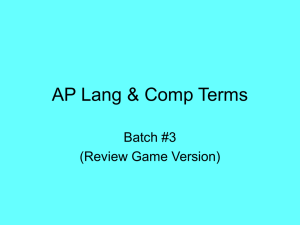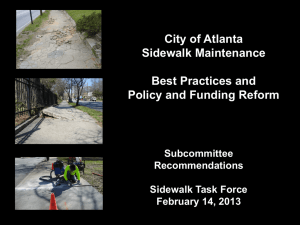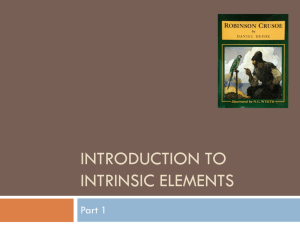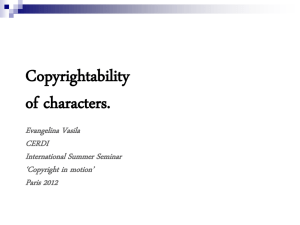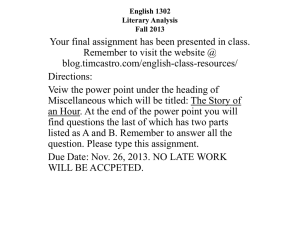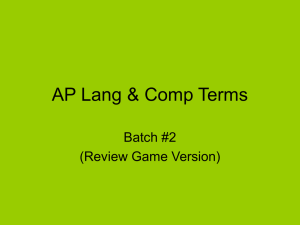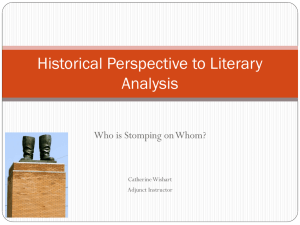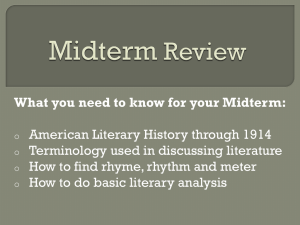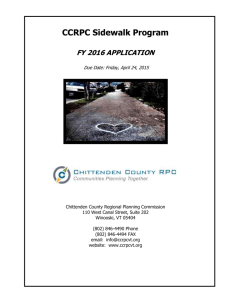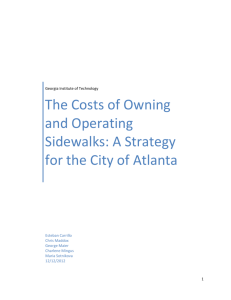Literary Devices
advertisement
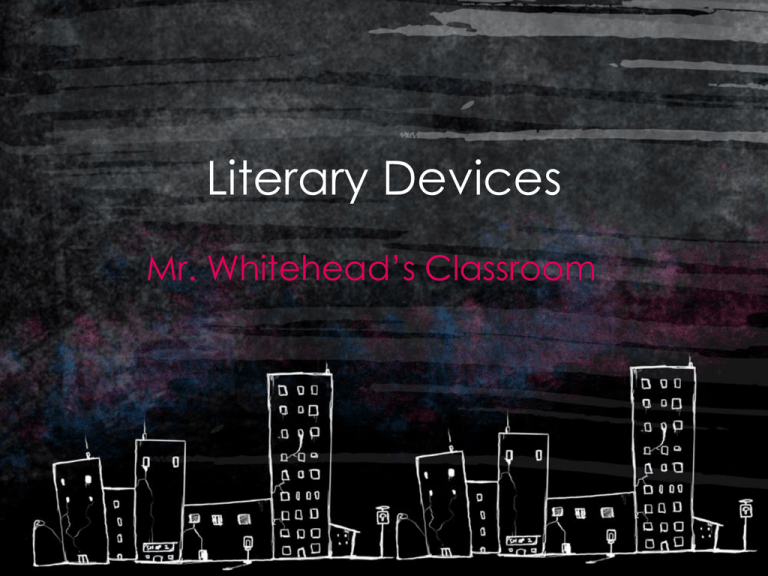
Literary Devices Mr. Whitehead’s Classroom What is a poem? A poem can take many forms. It can tell a story or just play with sounds. It can paint a picture. It can tell a joke or a riddle. It even can be a bunch of nonsense words strung together just for fun. However…. Despite these differences, you can often use the same skills you would use to carefully read and understand a fiction or nonfiction passage to understand all kinds of poetry. The Structure A line is the words contained in one line of text. Each group of lines is called a stanza. Where the Sidewalk Ends By Shel Silverstein There is a place where the sidewalk ends And before the street begins, And there the grass grows soft and white, And there the sun burns crimson bright, And there the moon-bird rests from his flight To cool in the peppermint wind. Let us leave this place where the smoke blows black And the dark street winds and bends. Past the pits where the asphalt flowers grow We shall walk with a walk that is measured and slow, And watch where the chalk-white arrows go To the place where the sidewalk ends. Yes we'll walk with a walk that is measured and slow, And we'll go where the chalk-white arrows go, For the children, they mark, and the children, they know The place where the sidewalk ends. Where the Sidewalk Ends By Shel Silverstein There is a place where the sidewalk ends And before the street begins, And there the grass grows soft and white, And there the sun burns crimson bright, And there the moon-bird rests from his flight To cool in the peppermint wind. Let us leave this place where the smoke blows black And the dark street winds and bends. Past the pits where the asphalt flowers grow We shall walk with a walk that is measured and slow, And watch where the chalk-white arrows go To the place where the sidewalk ends. Yes we'll walk with a walk that is measured and slow, And we'll go where the chalk-white arrows go, For the children, they mark, and the children, they know The place where the sidewalk ends. Literary Devices Rhyme scheme is the pattern of rhyming lines in a poem. This pattern can be represented by letters. For example, ‘Twas brillig, and the slithy toves did gyre and gimble in the wabe: All mimsy were the borogoves and the mome raths out grabe Beware the Jabberwock, my son! The jaws that bite, the claws that catch! Beware the Jubjub bird, and shun The frumious Bandersnatch!” Literary Devices Rhyme scheme is the pattern of rhyming lines in a poem. This pattern can be represented by letters. For example, ‘Twas brillig, and the slithy toves did gyre and gimble in the wabe: All mimsy were the borogoves and the mome raths out grabe Beware the Jabberwock, my son! The jaws that bite, the claws that catch! Beware the Jubjub bird, and shun The frumious Bandersnatch!” Where the Sidewalk Ends By Shel Silverstein There is a place where the sidewalk ends And before the street begins, And there the grass grows soft and white, And there the sun burns crimson bright, And there the moon-bird rests from his flight To cool in the peppermint wind. Let us leave this place where the smoke blows black And the dark street winds and bends. Past the pits where the asphalt flowers grow We shall walk with a walk that is measured and slow, And watch where the chalk-white arrows go To the place where the sidewalk ends. Yes we'll walk with a walk that is measured and slow, And we'll go where the chalk-white arrows go, For the children, they mark, and the children, they know The place where the sidewalk ends. 3. What is the rhyme scheme of the first stanza? A. B. C. D. AABBBA ABABAB AAABBB ABABCD 4. What is the rhyme scheme for the second stanza A. CADDDA B. AABBBA C. CBDDDA D. DABBBCA Literary Devices Alliteration is the use of two or more words that begin with the same consonant sound (such as c, t, th, cl, or dr). Such lines are called alliteration when they appear in a single line of poetry or within a phrase or sentence. For example, Susie sells Silly String at the soda stand. Literary Devices Onomatopoeia is the use of a word to represent a real sound. Hiss is an example of onomatopoeia. Animal sounds such as moo, baa, and meow are also onomatopoeic. Question 5. Which of these words is an example of onomatopoeia? a. broom b. buzz c. brown d. bore Literary Devices Repetition is the use of the same word or live over and over gain. This device is frequently used in song lyrics and folktales to establish rhythm and to make them easy to remember. Where the Sidewalk Ends By Shel Silverstein There is a place where the sidewalk ends And before the street begins, And there the grass grows soft and white, And there the sun burns crimson bright, And there the moon-bird rests from his flight To cool in the peppermint wind. Let us leave this place where the smoke blows black And the dark street winds and bends. Past the pits where the asphalt flowers grow We shall walk with a walk that is measured and slow, And watch where the chalk-white arrows go To the place where the sidewalk ends. Yes we'll walk with a walk that is measured and slow, And we'll go where the chalk-white arrows go, For the children, they mark, and the children, they know The place where the sidewalk ends. Literary Devices Figurative language is language that goes beyond the literal meaning of the words. A simile uses like or as to compare things. A metaphor says that one thing is another. Literary Devices Figurative language is language that goes beyond the literal meaning of the words. A simile uses like or as to compare things. A metaphor says that one thing is another. Literary Devices Questions (Y/N) 7. You are the light in my life. 8. Life is like a box of chocolates. 9. She is as busy as a bee. 10. He tried to help but his legs were rubber. 11. You are as brave as a lion. 12. He has the heart of a lion. Literary Devices Personification gives animals or objects human qualities. The moon peeked out from behind a cloud. The stars danced playfully in the moonlit sky. The run down house appeared depressed. The first rays of morning tiptoed through the meadow. She did not realize that opportunity was knocking at her door. Literary Devices Questions (Y/N) 13. The flowers waltzed in the gentle breeze. 14. The sun glared down at me from the sky. 15. The moon winked at me through the clouds above. 16. The wind sang through the meadow.


